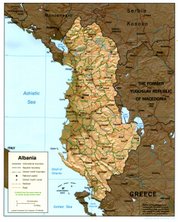At 11am on Friday (11/12) my friends, the Lekas, are knocking on my door and are ready, with the car driver, to load the luggage and the 20 carefully packed archival panels for the historic exhibit. My companion, Pertefe (who is also going to speak at the event in Tuz), and I are thus on the way north toward Montenegro.
After a bad crossing in the suburb of Tirana, called Kamza, the main road of which is in disrepair and the traffic is very intense, we sail smoothly on the newly paved highway to the city of Shkodra, which we reach in 1 ½ hour.
This old city, and ex capital of Albania, is in terrible condition. The roads with innumerable large potholes need repair, the apartment buildings look decrepit, but the place is bustling with activity. I am told that the Albanian state intentionally disregards the bad condition of this city because its population, by tradition, has always opposed the central government. To today they still lack electricity, which is available only for 4 hours daily! Nevertheless, people manage to live here. Many missionaries and a variety of religious sects have also established centers in this city, which used to be prevalently catholic, but now also has 3 new mosques.
We stop at Kujtim’s house. He is Pertefe’s brother and had invited me many times before. His wife Bela, who is a Dentist by profession, with her own office on the home premises, operates her equipment with the help of a generator. She quickly puts together a delicious and complete hot meal for everyone, driver included. My reluctance to accept such generous hospitality is overruled: "this is the Albanian way; consider our house to be your house" I am told!
One hour later we continue our trip and pass several sign indicating various villages along the road, which is not as good as the previous highway. The weather is still bad, the rain continues on and off. We reach the border (Hani i Hotit) right next to Lake Shkodra, that is almost dark, but it’s only 3:30pm. It’s easy to go thru the Albanian patrol. Show of passports and the payment of one euro is required. Our driver, however, does not have proper car insurance coverage for Montengro and thus his car is not allowed to go any further.
I spot the relatives waiting for us on the other side. They come forward, at the Montenegrin side of the border, and help us move our luggage from our car to theirs, while we go thru passport control by the Montenegrin guards.
Relative Kola U. and his English speaking son, Edmond (a law student) are extremely helpful. After exchanging greetings also with cousin Gjoka G. and his wife Tola, we ride in 2 cars into the town of Tuz (half hour away) under dark skies and drizzling rain. Midway we are met by a police car, and we stop to meet ‘Comandant’ Toma U., who gets out to greet us. He is the town Chief of Police and also a distant cousin, who wishes to escort us to the hotel.
After unloading the archival panels at Dr. Luke G.’s office, which is located right across the Gymnasium where we are going to have the planned affair on Sunday, we are delivered to the Imperjal Hotel in the city center.
After some refreshment with every one at the hotel’s bar, we go to Gjoka’s house, just a couple of blocks away. I have been here in 1996 when his lodgings consisted of only 3 rooms for a family of 6, but now the house has been raised to 3 floors, with 4 bedrooms on the 1st floor, a full size attic with a play room, another bedroom, and 2 beautiful balconies on the 3rd.
We are served some appetizers and drinks, while the dinner is being prepared. Daughter Nora, who is a beautiful and vivacious 16 old fluent in 5 languages, steps into translating the news we are exchanging when necessary, while helping her mother in the kitchen.
Lots of carefully prepared, delicious dishes are put on the table, which include rice, several vegetables, salads, meat and fish. Everything is extremely fresh and the sweet desserts, made with honey, must also be tried although we are quite satiated.
It was a busy day and an enjoyable evening. We finally hit the sack by 11pm.


